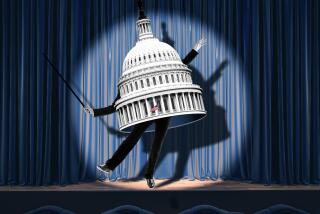Compromise Isn’t the Answer on NEA
- Share via
Sometime between today and the end of this month, the seemingly annual ritual of the attempted assassination of the National Endowment for the Arts will be played to its conclusion, by a conference committee in Congress.
We’ve watched this happen before and we predict: A House-Senate conference committee will reconcile differences between the House version of the NEA appropriation, which zeroed out the arts endowment, and the Senate version of the bill, which would not do so. Ultimately, the two chambers will settle on about $100 million for the NEA in the next fiscal year, but will impose yet more restrictions on it.
The outcome will probably be billed as a “victory” for the NEA and the arts because, it will be argued, the NEA at least survived. Nevermind that its budget is less than a third of what it should have been to maintain its 1979 purchasing power. Even if the deal sticks, it will leave this country with a weaker, more fearful and less effective arts agency because of the combination of political attacks and financial constraints over the last several years.
It has been argued frequently over the last half-dozen years that the NEA is no longer needed, either because local and state public arts agencies can do a better job or because the private sector could provide more than ample support for the arts without federal involvement.
The three of us represent some of the more pronounced success stories in local public-private support of the arts in this country. So some might expect us to be indifferent to the NEA’s survival.
But, emphatically, we aren’t. It is time to stop rationalizing attempts to kill the NEA.
When it was founded in 1965, the NEA was envisioned as an important source of support for cultural activities but also as a leader. This vision was the same as what Congress had in mind when it created analogues like the National Science Foundation, with a current annual budget of $3.3 billion.
Of course, not every scientific research project supported by the NSF has been successful. Yet over time, we have recognized its fundamental importance. What’s troubling is that successive congresses and presidential administrations have failed to realize that the NEA is just as important in the arts as the NSF is in the sciences, though it should be noted that President Clinton has threatened to veto an appropriation bill that zeros out the NEA.
An important aspect of the NEA’s national leadership ought to be--but in recent years has not been--as a guarantor of freedom of expression for the arts. We have no argument with the NEA’s choices on individual grants, although the agency has failed to make its operating processes open enough to the public. The NEA has indulged in geographic favoritism in its grant-making. More important, perhaps, the agency has not planned for creation of a dedicated public revenue stream that could be independent of annual political attacks.
But these deficiencies are no reason to eliminate the NEA or to keep it in such a state of near starvation that, though still technically alive, it cannot do its job. Without federal leadership, arts in the United States will be at risk of devolving into provincial enterprises lacking in policy direction, creative cohesion and daring.
Los Angeles has more of a stake in this than most local communities. We have the largest concentration of working artists in the country--150,000 of them. Agencies of local governments in Los Angeles County alone provide $60 million in support of all arts disciplines per year. Millions more are provided by foundations and corporate entities.
But this vibrant, healthy local arts community demonstrates, more than anything, the need for a strong, dynamic and creative NEA. Many of our arts organizations were propelled to their current artistic and financial success by NEA support, because the NEA remains an important credential by which to leverage local public and private funds.
The NEA should not just survive. It should be transformed, both financially and politically, to a position as one of the most significant and productive agencies in the entire federal government.
More to Read
The biggest entertainment stories
Get our big stories about Hollywood, film, television, music, arts, culture and more right in your inbox as soon as they publish.
You may occasionally receive promotional content from the Los Angeles Times.










